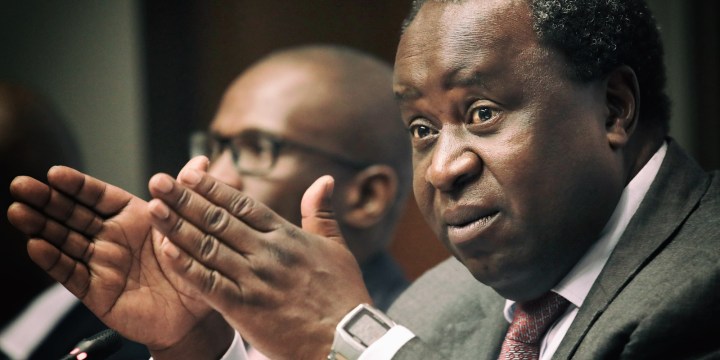Parliament
Adoption of emergency Covid-19 Budget one step closer

Parliament’s finance committees on Tuesday adopted the report on the revised fiscal framework that underpins Finance Minister Tito Mboweni’s emergency Covid-19 Budget. The DA, EFF and Freedom Front Plus rejected the report, which was carried by ANC numbers in a signal that the Special Adjustment Budget is to be approved.
It was about whether “welcoming” the R3-billion bailout of the Land Bank should rather be “noting” because a bailout by its nature indicates failure. Or whether the state should play an active role in the economy, rather than just creating an enabling environment.
It was about whether to call on Finance Minister Tito Mboweni to brief the committees on the low take-up of the R200-billion loan guarantee scheme, as suggested by DA MP Geordin Hill-Lewis, and Standing Committee on Finance chairperson Joe Maswanganyi’s quick retort, “So now you want an active state” in an echo of the earlier debate.
And it was about getting a full briefing on the zero-based budgeting approach Mboweni had talked about when tabling the Special Adjustment Budget on 24 June. Some discussion unfolded over whether this was an actual Cabinet decision, or just a ministerial statement.
That Special Adjustment Budget was a grim caution of a looming sovereign debt crisis with South Africa unable to fund itself by 2024 – debt to gross domestic product stands at 81.8% for 2020, up from 65% just four months ago – and rapidly increasing debt service costs. The economy, still in recession, is expected to contract by 7.2% because of the Covid-19 hard lockdown, while job losses are set to hit at least three million, and possibly more if recovery is slow. At the same time, tax collection has come in R304.1-billion short.
On Tuesday, ANC numbers on both the National Assembly and National Council of Provinces (NCOP) finance committees carried the revised fiscal framework.
It’s not what the Economists Initiative would want to hear, given their call on Parliament’s finance committees to reject the Special Adjustment Budget. That’s because the supplementary Budget failed to live up to the R500-billion package announced by President Cyril Ramaphosa in April, and actually took further steps to cut spending, turning this into an austerity measure while overplaying the risk of a sovereign debt crisis.
That call is captured in the committees’ report that will be debated over 77 minutes in the National Assembly on Wednesday 8 July. Once the revised fiscal framework is adopted, it’s on to the revised division of revenue draft law that will rejig allocations to provinces and municipalities.
A plethora of briefings is unfolding at committees, from communications to police and health on their adjusted budgets – some have lost, others gained – ahead of a week of mini-plenaries that give political parties time to have their say.
But while the Economists Initiative may not have got their way, the report adopted on Tuesday is not uncritical.
The R500-billion package announced in April was held to be insufficient. The report argued this was part of the second phase, while funding was anticipated in October’s Medium-Term Budget Policy Statement (MTBPS) for what President Cyril Ramaphosa had described as the “third phase” to drive South Africa’s economic recovery as the country emerged from the Covid-19 pandemic.
“It is not clear to the committee to what extent this second phase contributes to the third and we will be better able to tell following the October 2020 MTBPS and the February 2021 Budget,” said the draft committee report, describing the Special Adjustment Budget as “transitional intervention”.
Concerns cited, and set to feature in Wednesday’s debate, include a lack of detail in infrastructure projects and funding, the slow pace of releasing additional broadband to support digitalisation and the need to do more to stop illicit financial flows of up to R250-billion a year out of South Africa.
National Treasury and the South African Revenue Service (SARS) should explore more effective ways of boosting revenue by taxing income and profits in the digital economy, even if South Africa already is one of the few countries collecting value-added tax.
Severe and unprecedented constraints have hit the Budget, given the Covid-19 pandemic and lockdown, but with “hunger stalking the country”, the parliamentary finance committees said that for those without an income, government needed to consider a basic income grant.
And while the final vote on the Covid-19 emergency Budget is scheduled for 29 July, the earliest indications on a basic income grant would only be in the MTBPS in October. DM


















 Become an Insider
Become an Insider